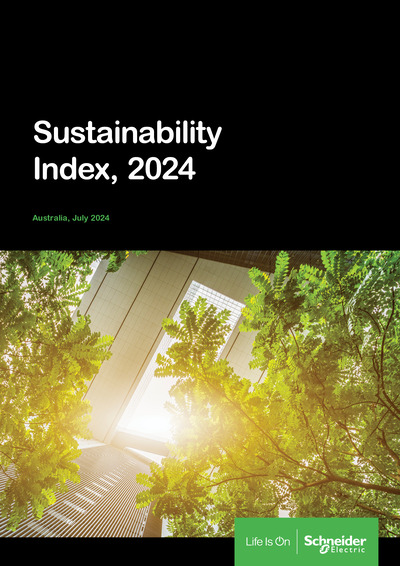This post was originally published on Sustainability Matters

A deep digital divide is emerging in corporate approaches to sustainability, potentially undermining Australia’s journey to net zero, according to Lisa Zembrodt, principal and senior director of Sustainability Business for Schneider Electric.
The ‘Sustainability Index, 2024’, a survey commissioned by Schneider Electric, a global leader in the digital transformation of energy management and automation, highlights this growing risk. It surveyed more than 500 corporate decision-makers across industries and the nation on sustainability and their progress towards net zero.
“The Sustainability Index reveals a digital divide between those with access to digital data and analysis, and those lagging in digital adoption,” Zembrodt said. “We found two-thirds of companies are still relying on energy bills or spreadsheets to inform their energy management.
“Most companies agreed that data limitations were impacting their decision-making, she said. “This is a significant barrier to monitoring and improving energy efficiency and sustainability.”
These contrasting approaches are reflected in a gap between companies planning and acting to reach net zero, and those lacking any strategy or commitments to reduce their emissions, Zembrodt said.
The ‘Sustainability Index’, now in its fourth year, found that most business leaders endorsed the energy transition and 70% agree that sustainable transformation provides a competitive edge.
However, the survey found that less than 1 in 5 companies have a decarbonisation roadmap or strategy in place, and 40% are not acting to decarbonise.
In more positive news, nearly three-quarters of companies surveyed said digital technology plays a key role in achieving sustainability, and a majority are increasing spending on digital transformation.
More than a third of businesses are using or planning to use AI to help manage their decarbonisation transformation, the index revealed. It demonstrated a flip side to AI’s intensive energy appetite, Zembrodt, said.
Acting on decarbonisation requires digital data and analysis, said Zembrodt. “Information is power, data is key to managing climate risk — without it, companies don’t have insights into what’s driving their emissions.
“If companies have access to real-time data, combined with control and analysis, there is much greater scope to respond to emerging issues, see where there are inefficiencies, pivot where possible and increase sustainability.
“Technology ranging from digital twins to monitoring, visualisation and automation are among the quickest ways to understand and reduce emissions.”
Compared to three years ago, 46% of companies stated they were investing more in AI and analytics, while only 5% were investing less.
Nearly one in 10 companies say they are already using artificial intelligence as a resource for decarbonisation transformation, the survey found. One in four say they are implementing AI strategies and another 29% said they were discussing doing so.
Zembrodt said that although AI processes were energy intensive, productive uses of AI included advanced algorithms to reduce energy consumption and emissions by optimising energy intensive processes such as heating and cooling systems in buildings. It can also schedule and optimise energy demand to alleviate consumption peaks.
“The role of technology is critical in the management of the net zero transition,” said Zembrodt. “Digital tools can also offer great support for business in monitoring and controlling emissions.”
The survey found that 53% of companies were increasing their investment in digital transformation, 39% in automation, and 36% in renewable power. Among respondents, three in four agreed that digital can help deliver their company’s sustainability goals.
“This survey shows companies increasingly recognise the critical role technology plays in moving to a low carbon economy, with most investing more in digital transformation than they were three years ago.”
However, Zembrodt warned that although businesses see sustainability as offering a competitive advantage, many companies were failing to realise the urgency of climate action.
“With new climate-related financial disclosure regulations rolling out next year, having a roadmap to transition your business to the low-carbon economy will be essential. Companies should urgently develop and implement a net zero plan.”
The disclosure rules — based on standards set by the International Sustainability Standards Board — will require companies to reveal extensive information on climate-related issues, including governance, strategies, risk management and targets.
Australia was “years behind” leading nations on climate reporting, with a lack of information making investors — who are increasingly focused on climate action and climate risks — unsure when weighing up where they put their money, Zembrodt said.
In the survey, business leaders identified the main barriers to adopting sustainable solutions: 37% cited a lack of financial resources, 36% said their business did not see it as urgent, and 33% cited a lack of government incentives.
The index demonstrates that companies want more government support to decarbonise. One-third of respondents said regulation is the main driver for decarbonisation and most (81%) believe that the government should provide financial incentives to support sustainable transformation.
Zembrodt urges companies to begin their journey to net zero now. “The benefits of setting targets and a net zero roadmap include an increased capacity to attract investment, satisfying shareholder and community concerns, while avoiding regulatory exposure and penalties.
“Companies should not wait to act on a decarbonisation plan, the tools and technology exist today to improve efficiency and cut emissions. This can drive energy costs lower, while making a real contribution to lessening climate change and saving our planet,” she said.
Image credit: iStock.com/Gang Zhou





0 Comments